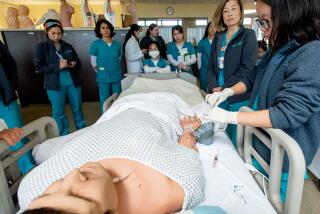Students learn to help elderly cope with chronic conditions
- Share via
At first it was easy enough to escort her mother to doctors’ appointments, make sure her fridge was stocked and help her buy clothes. But as Nansea Clendenen’s mother grew sicker, “it became very complicated,” the daughter said. Were there enough oxygen tanks? Was there a stock of nebulizers?
By the end, the chores stretched from morning until night. She cared for her mother until she died in 2004 and promised her she would continue working with aging adults. “It was important that we let her know that her pain and suffering was not for nothing,” Clendenen said.
So when Clendenen heard about a new program at Valencia’s College of the Canyons designed to train students to help the elderly cope with chronic medical conditions and live more comfortably, she wasted no time in signing up.
The semester-long pilot program is the first of its kind in the country, administrators said.
The aim is to “bring some standards to the profession for persons who work with the aging,” said Bette Dow, senior program officer at the U.S. Department of Education’s Fund for the Improvement of Post Secondary Education, which provides funding.
During the first term, which ended Friday, Clendenen studied what it’s like to grow old. She learned the physical and mental changes involved, and how aging affects behavior and communication.
Most importantly, she learned practical skills to help seniors remain healthy as they age: strategies to prevent falls, reduce stress and improve their nutrition
“It’s been a life-changing experience for me,” she said.
The two dozen or so students who completed the first semester will earn a certificate in Skills for Healthy Aging Resources and Programs. A new batch of students will start the program in January.
Baby boomers are nearing retirement and more have chronic diseases and will “need assistance, but we don’t have the people power yet” to do this, said Patty Robinson, dean of social sciences and business at College of the Canyons.
Most people who deliver services to older adults are not formally trained, according to administrators of the new program. The courses seek to create expertise in what experts term “evidence-based health promotion strategies.”
Dow said the program, which includes fieldwork, differs from a regular degree course in gerontology because it’s more hands-on and emphasizes practical, care-giving skills. “This is a way for getting people’s feet wet,” Dow said.
Students come away with skills to work in senior centers and homes and service agencies. They learn how to impart such techniques as “progressive relaxation,” said Janet Frank, a specialist in geriatric medicine and gerontology at UCLA. The process involves tensing the facial muscles, then consciously relaxing them, and repeating the process with the shoulders, all the way down to the feet, Frank said.
They also learn to help elderly people who live at home, Dow said. The guidance could include something as simple as showing a senior how to use Velcro as a fastener in place of buttons or zippers, or sticking reminder notes on drawers, Dow said.
The new program, also planned for Santa Barbara City College, is proving popular. On a recent evening, around a dozen prospective students gathered in a lab on the Valencia campus to hear details of next semester’s program.
Most were women, some in their 50s and 60s. Among them were a retired law firm bookkeeper, a single mother of two and a communications specialist turned underwriter. Some already had degrees and had worked in other careers. Many hoped to make themselves more marketable to reenter the workforce. And, like Clendenen, most cited stated a personal connection as their primary motivation.
Administrators were unable to say what type of salary a student who graduates from the program might command, but Dow said certificate holders would probably be in a position to snag jobs “a little step above entry level.”
Barbara Sheaffer, 54, who just completed the classes, hopes the skills she gained will complement a degree in psychology she returned to school to pursue four years ago.
The program has made her realize “how little I know about aging ... and what’s going on for people as they experience that changing role,” said Sheaffer, a mother of nine. “I was surprised by how negative our culture looks at the elderly.”
More to Read
Sign up for Essential California
The most important California stories and recommendations in your inbox every morning.
You may occasionally receive promotional content from the Los Angeles Times.











